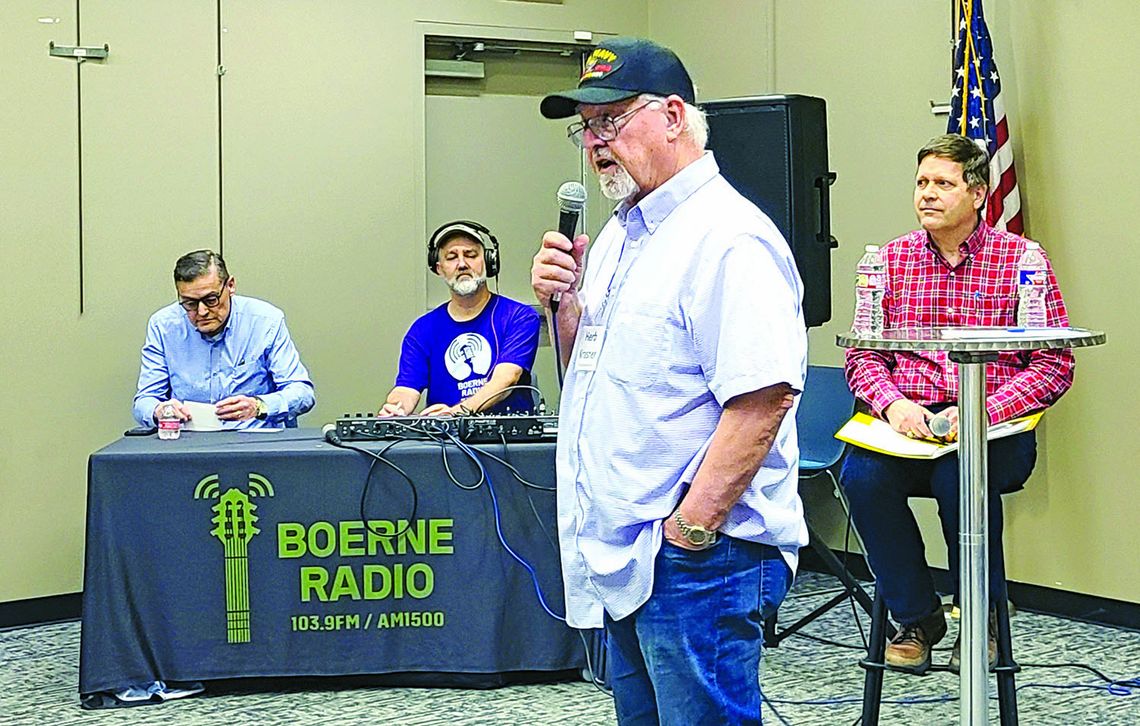The school voucher bill making its way through the Texas Legislature is either an attempt by a bully governor to divert public school funds to private schools, or a vehicle to champion parents’ rights.
That’s what more than 50 residents attending a Tea Party sponsored debate heard last week.
“Gov. Greg Abbott is a bully,” said Herb Krasner, a retired educator who spent 20 years at the University of Texas at Austin and is an opponent of Texas Senate Bill 2.
He spoke opposite Kendall County Tea Party President Dale Adams, owner of The Boerne Bookshop, a proponent of the bill, at the Feb. 4 debate held in the Heath Public Library. The Tea Party group invited Krasner to debate the subject with Adams.
Columns Krasner has written in opposition to the bill have appeared in a number of area newspapers. He questioned why Abbott has deemed this an emergency for the current legislative session and suggested the answer could be found if one “follows the money.” He posited that Republicans in Austin are seeking to avoid accountability for historically under-funding public schools and raised alarms concerning a facet of the bill which would delegate to private entities management of the more than $1 billion to be allocated for school choice.
Senate Bill 2 provides for the establishment of “education savings accounts” (ESAs). Parents who apply for assistance could receive approximately $10,000 to send their child to the school of their choice.
The program would prioritize families designated as “low income.” The bill defines “low income” as “a household with a total annual income that is at or below 500 percent of the federal poverty guidelines.”
The federal Health and Human Services website states that $32,150 is demarcated as the poverty level for annual income for a family of four. Five hundred percent of that amount is $160,750.
The bill also states that “certified educational assistance organizations” would “support administration of the program.” The bill further states “an organization may apply to the comptroller for certification as a certified education organization” under provisions of the bill.
Krasner said he believes this could open the door to “waste, fraud, abuse and corruption” and to undue influence from special and private interests not directly accountable to voters.
“Private schools don’t have to play by the same rules as public schools,” he said, adding that private schools will likely raise tuition to account for the “added money that will be infused into the system.”
But Adams took issue with Krasner’s take on vouchers, focusing on education choice, and academic outcome.
“This issue has arisen because parents (generally) are not satisfied with the level of their children’s education and its outcomes,” Adams said.
He noted that this is likely not the case for Boerne ISD residents but is very much the case for parents in poorer and lower-performing districts. “We have a great district here,” he said. Adams served on the BISD board from 2013 to 2019.
Many Texas children are not fortunate enough to live in a successful district such as Boerne’s, he said.
“We have a form of school choice now – if you are rich enough to move to a better district,” he said.
Adams touted two guiding principles: first, that “keeping people as free as possible” is paramount. Parents want the best for their children and are the most likely to know what that is and should be empowered to make decisions concerning their child’s education, he said.
His second principle is that “competition is a catalyst for progress.” Adams argued that if public schools face the proposition of losing students to private schools, they would be greatly incentivized to improve their performance.
Adams said there are two types of accountability: One where someone, such as a state agency, oversees public schools; another is what he called “impact accountability.” In the event a student “walks away” from the public- school setting, that impact would create the challenge for improvement.
Adams admitted that the provision to hand oversight of the ESA program over to private entities gives him pause; however, “the government has a lot of experience working with private entities.” He cited Medicare payments, private hospitals, Pell grants, road construction and even the construction of spacecraft as examples.
The Texas Senate Wednesday passed Abbott’s school voucher bill by a vote of 19-12, fast-tracking the bill to the House, where Republicans feel they now have the votes to approve the measure.










Comment
Comments